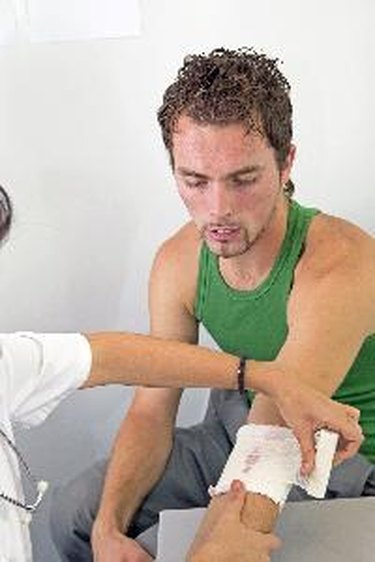
Wound closure, whether due to an accidental injury or a surgical incision, is a complex process that involves blood and immune cells, tissues and compounds called cytokines, and growth factors. Nutrients are also needed for the increased metabolic activity that occurs when the body is healing, and a deficiency in certain vitamins can lead to impaired wound healing time and a poor outcome. Vitamin E is the primary antioxidant nutrient in the skin and is linked to improved healing and diminishing scars on the skin. Although its effects are not yet medically proven, vitamin E is an important factor in wound healing.
Phases of Wound Healing
Video of the Day
Injury to the skin or tissue triggers a response from the immune system to first cleanse the wound of any foreign material and devitalized tissue, according to the University of Maryland Medical School. This initial phase of wound healing includes a vascular or blood response in which the platelets or clotting factors secrete chemicals called growth factors and cytokines. Next, the inflammatory phase causes erythema or redness, swelling and warmth as immune cells kill any bacteria in the area. In the proliferative phase new granular tissue and skin cells form in the wound, and in the final phase remodeling occurs, helping to strengthen the closure of the wound.
Video of the Day
When to Seek Medical Help
Minor wounds of the skin can usually be treated at home. However, if a cut is larger than a half inch in length and fat, or if muscle or bone can be seen through it, medical treatment is needed. Emergency is also needed if a wound is caused by the bite of an animal or human. Also seek immediate medical help if a wound shows signs of an infection such as local inflammation or redness, a white pus discharge, red lines appear in the wound area or if you have chills or a fever.
Types of Vitamin E
Vitamin E is an essential vitamin that has antioxidant properties. It is fat-soluble, meaning that it can be stored in small amounts in the body. The Mayo Clinic notes that this nutrient exists in eight different forms with a type called alpha-tocopherol being the most active form in the body. Supplements of vitamin E are typically provided in this form and may be synthetic or naturally produced. The natural forms of this vitamin may be more easily absorbed by the body and are labeled with the letter "D," such as d-gamma-tocopherol. A deficiency of vitamin E can lead to slowed and inadequate wound healing and can increase the risk of scarring of the skin.
Vitamin E Dosage
The recommended daily dose of this nutrient is 400 to 800 IUs, however higher doses may be advisable for larger wounds and burns. Vitamin E can be taken in supplement form as well as via vitamin E-rich foods such as vegetable oils, almonds and nuts and green leafy vegetables. Do not take more than the recommended dose without the guidance of your doctor. Vitamin E can thin the blood and cause excess bleeding, hence it should not be taken before a surgery or medical procedure in which the skin or tissues will be cut or damaged.